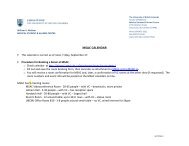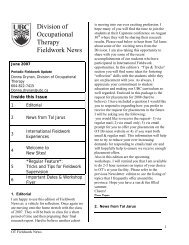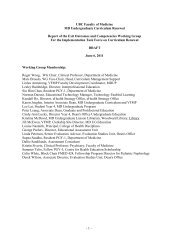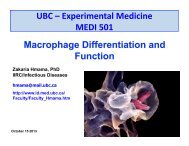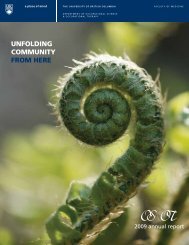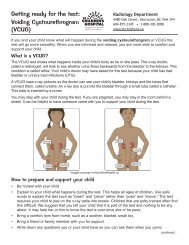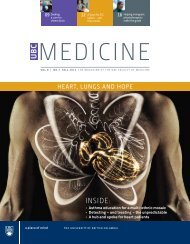MEDICINE
download a copy - University of British Columbia Faculty of Medicine
download a copy - University of British Columbia Faculty of Medicine
- No tags were found...
Create successful ePaper yourself
Turn your PDF publications into a flip-book with our unique Google optimized e-Paper software.
8 UBC <strong>MEDICINE</strong><br />
FOCUS ON:<br />
Environmental<br />
Health<br />
A DNA molecule that has been “tagged” through methylation. Illustration: Christoph Bock/Max Planck Institute for Informatics<br />
At the nexus of nature and nurture<br />
By now, the experiment is a familiar reference point – perhaps<br />
the reference point – for the study of epigenetics, the science of<br />
gene expression.<br />
Like many experiments, it involved rats. But this one seemed to<br />
resonate with humans in a way that few others do.<br />
In brief: it compared the pups of nurturing mothers – those who<br />
made their milk readily available, and spent a lot of time licking<br />
their progeny – with the pups of those who were less attentive<br />
to their young. The pups of the less attentive mothers were more<br />
vulnerable to stress, and this difference corresponded to chemical<br />
tags on certain genes.<br />
The findings electrified a whole segment of developmental<br />
scientists by demonstrating how environmental conditions can<br />
affect gene expression, and thus alter the trajectory of cells and<br />
whole organisms. In other words, it showed how life circumstances<br />
can get “under the skin,” affecting behaviour through biological<br />
mechanisms.<br />
But the implications for human development remain almost as<br />
murky as ever, impeded by the hard requirements for scientific<br />
validation: large sample sizes, to establish correlations<br />
with statistical confidence, and long timeframes, to allow<br />
environmental conditions to make their mark.<br />
Michael Kobor, however, is not the least bit intimidated.<br />
“Whenever there is a challenge, I look at it as an opportunity,” says<br />
Dr. Kobor, an Associate Professor of Medical Genetics and a Senior<br />
Scientist of the Centre for Molecular Medicine and Therapeutics<br />
(CMMT). “We’re off to the races.”<br />
Dr. Kobor, a native of the Black Forest region of Germany, concedes<br />
he is predisposed to optimism – whether it’s a genetic inheritance,<br />
or something he developed through experience, is hard to say. But<br />
he has good reason to be confident.<br />
For one, he has teamed up with McGill University Professor<br />
Michael Meaney, the scientist who designed those rat<br />
experiments. Secondly, they have gained access to data about<br />
hundreds of children from around the world, including information<br />
about their upbringing and DNA-rich blood samples. And they have<br />
secured a $1.5 million grant from the Brain Canada Foundation to<br />
make sense of it all.<br />
Their project will be the first genome-wide examination of how<br />
childhood experience affects the human brain.<br />
Their focus is methylation, the bonding of a molecule made up of<br />
carbon and hydrogen to parts of the DNA. These compounds act<br />
as “dimmer switches” on genes, and thus play an enormous role



